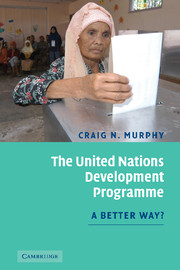Book contents
- Frontmatter
- Contents
- List of figures
- List of tables
- Foreword by Kemal Dervis
- Acknowledgements
- 1 Not the standard image
- 2 Development and the United Nations
- 3 Institutions for practical solidarity
- 4 Decolonization and economic transformation
- 5 Lewis in Ghana and after
- 6 Capacity, consensus, crisis, and consequences
- 7 Engaging liberation movements and revolutionary states
- 8 A learning organization: women, Latin America, and Africa
- 9 ‘Bottoms up’ development helps make UNDP a mammal
- 10 Working for ‘a holy man’ after the cold war
- 11 ‘Fabian socialists do not make the cut’
- 12 ‘Ploughing the sea’? UNDP and the future of global governance
- Index
Foreword by Kemal Dervis
Published online by Cambridge University Press: 08 January 2010
- Frontmatter
- Contents
- List of figures
- List of tables
- Foreword by Kemal Dervis
- Acknowledgements
- 1 Not the standard image
- 2 Development and the United Nations
- 3 Institutions for practical solidarity
- 4 Decolonization and economic transformation
- 5 Lewis in Ghana and after
- 6 Capacity, consensus, crisis, and consequences
- 7 Engaging liberation movements and revolutionary states
- 8 A learning organization: women, Latin America, and Africa
- 9 ‘Bottoms up’ development helps make UNDP a mammal
- 10 Working for ‘a holy man’ after the cold war
- 11 ‘Fabian socialists do not make the cut’
- 12 ‘Ploughing the sea’? UNDP and the future of global governance
- Index
Summary
While the United Nations Development Programme has been a significant player in the field of international development for more than forty years, its evolution is not widely known nor easily understood.
This is the organization's first published history. It is only one of many possible histories of UNDP that could have been written, and is not an organizational history in the traditional sense. My predecessor, Mark Malloch Brown, who commissioned this project, wanted the book to be a work of genuinely independent scholarship, hence, it is in many ways more essay than chronicle. It could not have been written without the help of many people who have been part of UNDP, who contributed their experiences and insights, knowing full well that what the author would eventually write might be very different than what they would have.
Professor Craig Murphy tells the story building on a truly impressive amount of research and lets an overarching theme emerge. The central argument of the book is that UNDP has increasingly become a learning organization, an approach which may provide models for the larger reform of the United Nations. The key aspect of UNDP's learning achievements has been the wonderful creativity and abiding commitment of the people who work for it. The overwhelming majority of UNDP staff have been people who passionately believe in the goals of the organization, individuals who have overcome daunting obstacles – and often the conventional wisdom of the day – to develop hundreds of initiatives, many of which are cited in this book, as well as countless others.
- Type
- Chapter
- Information
- The United Nations Development ProgrammeA Better Way?, pp. ix - xPublisher: Cambridge University PressPrint publication year: 2006
- 2
- Cited by

